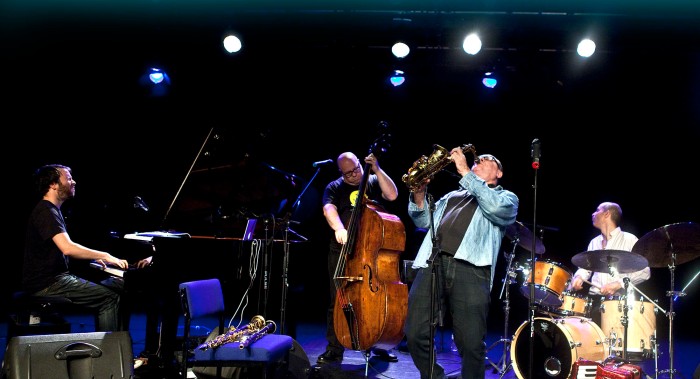Gilad Atzmon & the Orient House Ensemble at the Arena Theatre.
http://thejazzbreakfast.com/2013/12/08/gilad-atzmon-the-orient-house-ensemble/
Gilad Atzmon & the Orient House Ensemble

Gilad Atzmon & the Orient House Ensemble at the Arena Theatre. (Photo © John
Watson/jazzcamera.co.uk)
Reviewed by John Watson
Arena Theatre, Wolverhampton UK
07-12-13
Israeli-born saxophonist and clarinettist Gilad Atzmon has been one of the most engaging, exciting, and often unpredictable artists on the scene since he settled in London in 1994.
Though he has often appeared in the West Midlands with some fine regional rhythm sections, Atzmon is usually heard at his best with his own band, the Orient House Ensemble.
They are on a tour to celebrate Gilad’s 50th birthday as well as to promote a new album, Songs Of The Metropolis, and on Saturday they performed to a packed house in the Jazz At The Arena series.
The saxophonist appeared with two of the band’s regular members, pianist Frank Harrison and bassist Yaron Stavi, but drummer Eddie Hick was unavailable. His absence was more than made up for by the appearance of the brilliant Asaf Sirkis, the group’s original drummer. It was a delightful reunion.
Underpinned by this rock-solid rhythm section, Atzmon’s alto and soprano saxophones and clarinet hovered, swooped and dived like birds of prey.
The new album is Atzmon’s homage to significant cities and towns throughout the world, including many places where the group has performed on its international tours. The influence of Middle Eastern music – from the vibrance of Jewish klezmer to the passionate, imploring cry of Arabic song – remains strong in the group’s work, but there are also elements of Eastern European and gipsy music.
The stylistic approach of the Orient House Ensemble may be eclectic, but Atzmon’s restless boppish improvising provides a stylistic unity to the music. However, Saturday’s performance began with a gentle, romantic tribute to Paris, with Gilad on accordion and rippling arpeggios from pianist Harrison, before the band moved up several gears with musical tributes to Moscow, Tel Aviv, New York (with a lovely reworking of Autumn In New York) and Buenos Aires (with, of course, a tango).
The music really caught fire with a fierce uptempo Middle Eastern piece, The Burning Bush, with Sirkis stoking up the intensity to a white-hot level, and a captivating version of Scarborough Fair. This began with Atzmon pointing the bell of his soprano at the piano strings, setting up colourful resonances and subtly hinting at elements of the tune, before the rhythm section kicked off a powerful 6/8 modal vamp. The sheer passion of the saxophonist’s improvising on this piece, and the almost furious intensity of the rhythm section, evoked the glorious style of the John Coltrane Quartet – a wonderful storm of sound.
Gilad is always unpredictable on stage, and in the past has sometimes indulged in a forthright political stance that many music lovers find off-putting (the band, by the way, is named after Orient House, once the East Jerusalem headquarters of the Palestine Liberation Organisation).
No one should doubt the sincerity of his strongly expressed anti-Zionist beliefs, but many question whether a jazz concert is the right platform to explain and promote them. However, on Saturday he was in a humorous rather than an explicitly political mood, and while the jokes ran on too long in the first half of the concert he let the music dominate the second.
For an encore, he chose the soulful ballad Georgia, but for some unfathomable reason performed it as a virtual parody of the R&B style… suddenly we had left Parker and Coltrane territory and were in the musical world of a saxophonist like Pee Wee Ellis. Cliché after bluesy cliché poured from the bell of Atzmon’s alto.
This was a bizarre way to end a concert, but at a Gilad performance you should always expect the unexpected.